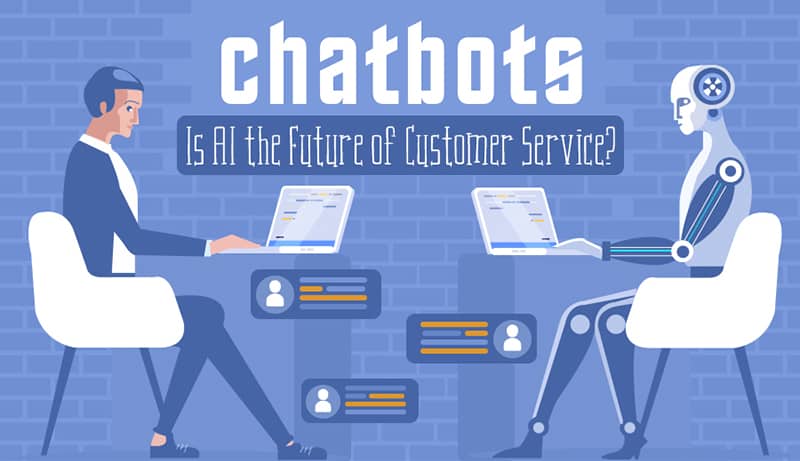

The Future of AI in Customer Service: Revolutionizing the Way We Interact
The advent of Artificial Intelligence (AI) has transformed the customer service landscape, providing businesses with innovative solutions to enhance customer experiences, reduce costs, and improve operational efficiency. As AI technology continues to evolve, its impact on customer service is expected to be profound, revolutionizing the way companies interact with their customers. In this article, we will explore the future of AI in customer service, examining the trends, benefits, and challenges that lie ahead.
The Rise of Chatbots and Virtual Assistants
One of the most significant advancements in AI-powered customer service is the development of chatbots and virtual assistants. These intelligent systems use Natural Language Processing (NLP) to understand customer inquiries, providing instant responses to common queries and freeing up human customer support agents to focus on more complex issues. Chatbots are already being used by companies such as Domino’s Pizza, allowing customers to order pizzas and track their delivery status via messaging platforms like Facebook Messenger.
The next generation of chatbots will be even more sophisticated, with the ability to understand nuances of language, detect emotions, and respond empathetically. Virtual assistants, like Amazon’s Alexa and Google Home, will become more prevalent, enabling customers to interact with companies using voice commands. This shift towards voice-based interactions will require businesses to adapt their customer service strategies, investing in AI-powered speech recognition and sentiment analysis.
Personalization and Predictive Analytics
AI-driven customer service will also focus on personalization, using machine learning algorithms to analyze customer data and tailor interactions to individual preferences. For instance, a customer who frequently purchases from an online retailer will receive personalized product recommendations, offers, and loyalty rewards. This level of personalization will increase customer satisfaction, drive loyalty, and boost revenue.
Predictive analytics will play a crucial role in identifying trends and patterns in customer behavior, enabling companies to proactively address potential issues before they escalate. By analyzing customer data, AI systems can detect early warning signs of dissatisfaction, allowing businesses to intervene and prevent churn.
Sentiment Analysis and Emotional Intelligence
As AI-powered customer service systems become more advanced, they will need to develop emotional intelligence to truly understand customer emotions. Sentiment analysis will become a critical component of AI-driven customer service, enabling companies to detect and respond to customer emotions in real-time. This will involve analyzing customer feedback, social media posts, and voice interactions to identify emotional cues, such as frustration, anger, or delight.
AI systems will use this emotional intelligence to respond empathetically, providing customers with a more human-like experience. For example, a customer service chatbot may respond to a frustrated customer with a calming message, apologizing for the inconvenience and offering a solution.
Human-AI Collaboration: The Future of Customer Service
While AI will undoubtedly revolutionize customer service, it is unlikely to replace human customer support agents entirely. Instead, AI will augment human capabilities, freeing up agents to focus on high-value tasks that require empathy, creativity, and complex problem-solving. The future of customer service will involve a harmonious collaboration between humans and AI, with AI handling routine inquiries and humans providing emotional support and expertise.
Benefits of AI in Customer Service
The benefits of AI in customer service are numerous:
- Cost Savings: AI-powered chatbots and virtual assistants can reduce the need for human customer support agents, resulting in significant cost savings.
- 24/7 Support: AI systems can provide round-the-clock support, ensuring that customers receive instant responses to their inquiries.
- Improved Accuracy: AI-driven systems can process vast amounts of data quickly and accurately, reducing the likelihood of human error.
- Enhanced Customer Experience: Personalization, sentiment analysis, and emotional intelligence will enable companies to provide customers with a more tailored and empathetic experience.
- Increased Efficiency: AI can automate routine tasks, freeing up human customer support agents to focus on complex issues and improving overall efficiency.
Challenges and Limitations
While AI has the potential to transform customer service, there are challenges and limitations to be addressed:
- Data Quality: AI systems require high-quality data to function effectively, which can be a challenge, especially for companies with limited resources.
- Integration: Integrating AI-powered customer service systems with existing infrastructure can be complex and time-consuming.
- Security: AI systems can be vulnerable to cyber attacks and data breaches, highlighting the need for robust security measures.
- Job Displacement: The automation of customer service roles may lead to job displacement, requiring companies to retrain and upskill their workforce.
- Emotional Intelligence: AI systems may struggle to fully understand human emotions, leading to potential limitations in providing empathetic support.
Conclusion
The future of AI in customer service is promising, with the potential to revolutionize the way companies interact with their customers. Chatbots, virtual assistants, personalization, predictive analytics, and sentiment analysis will become essential components of customer service strategies. While challenges and limitations exist, the benefits of AI in customer service are undeniable, including cost savings, improved accuracy, and enhanced customer experiences.
As AI technology continues to evolve, businesses must adapt and invest in AI-powered customer service solutions to remain competitive. By understanding the trends, benefits, and challenges of AI in customer service, companies can harness its power to create a seamless, empathetic, and personalized customer experience that drives loyalty, revenue, and growth.




